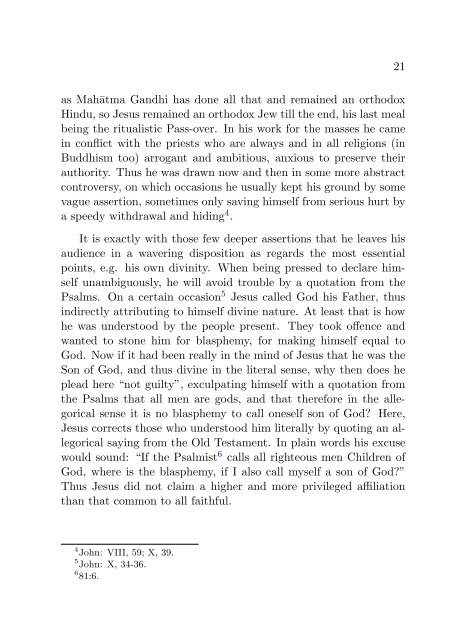Towards the Truth
Notes from a three-day debate in the 1940’s about Buddhism and Christianity.
Notes from a three-day debate in the 1940’s about Buddhism and Christianity.
Create successful ePaper yourself
Turn your PDF publications into a flip-book with our unique Google optimized e-Paper software.
21<br />
as Mahātma Gandhi has done all that and remained an orthodox<br />
Hindu, so Jesus remained an orthodox Jew till <strong>the</strong> end, his last meal<br />
being <strong>the</strong> ritualistic Pass-over. In his work for <strong>the</strong> masses he came<br />
in conflict with <strong>the</strong> priests who are always and in all religions (in<br />
Buddhism too) arrogant and ambitious, anxious to preserve <strong>the</strong>ir<br />
authority. Thus he was drawn now and <strong>the</strong>n in some more abstract<br />
controversy, on which occasions he usually kept his ground by some<br />
vague assertion, sometimes only saving himself from serious hurt by<br />
a speedy withdrawal and hiding 4 .<br />
It is exactly with those few deeper assertions that he leaves his<br />
audience in a wavering disposition as regards <strong>the</strong> most essential<br />
points, e.g. his own divinity. When being pressed to declare himself<br />
unambiguously, he will avoid trouble by a quotation from <strong>the</strong><br />
Psalms. On a certain occasion 5 Jesus called God his Fa<strong>the</strong>r, thus<br />
indirectly attributing to himself divine nature. At least that is how<br />
he was understood by <strong>the</strong> people present. They took offence and<br />
wanted to stone him for blasphemy, for making himself equal to<br />
God. Now if it had been really in <strong>the</strong> mind of Jesus that he was <strong>the</strong><br />
Son of God, and thus divine in <strong>the</strong> literal sense, why <strong>the</strong>n does he<br />
plead here “not guilty”, exculpating himself with a quotation from<br />
<strong>the</strong> Psalms that all men are gods, and that <strong>the</strong>refore in <strong>the</strong> allegorical<br />
sense it is no blasphemy to call oneself son of God? Here,<br />
Jesus corrects those who understood him literally by quoting an allegorical<br />
saying from <strong>the</strong> Old Testament. In plain words his excuse<br />
would sound: “If <strong>the</strong> Psalmist 6 calls all righteous men Children of<br />
God, where is <strong>the</strong> blasphemy, if I also call myself a son of God?”<br />
Thus Jesus did not claim a higher and more privileged affiliation<br />
than that common to all faithful.<br />
4 John: VIII, 59; X, 39.<br />
5 John: X, 34-36.<br />
6 81:6.
















